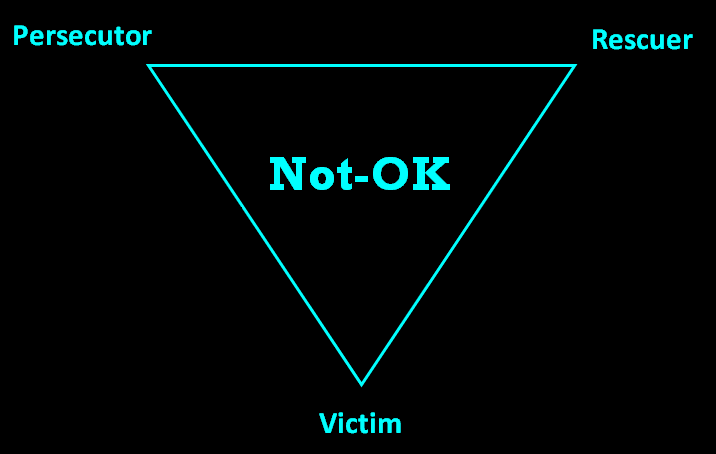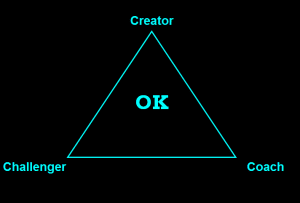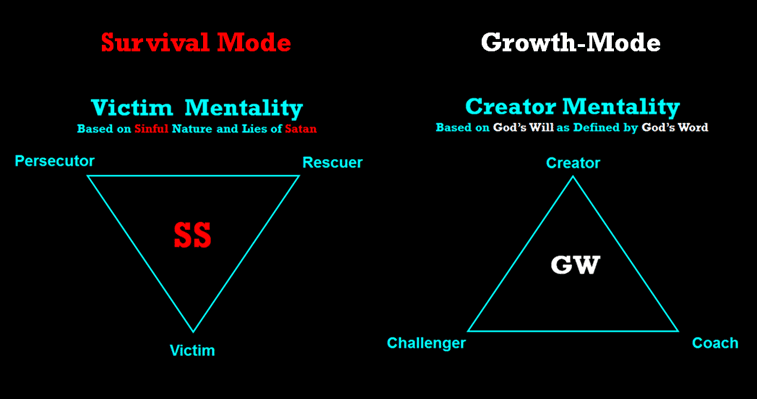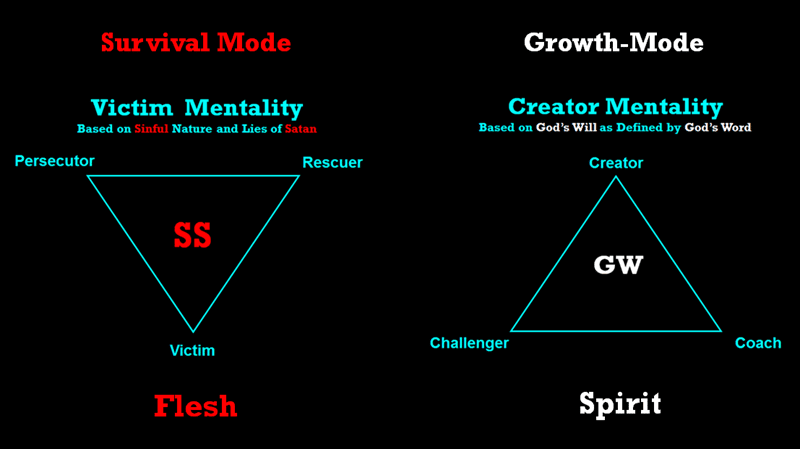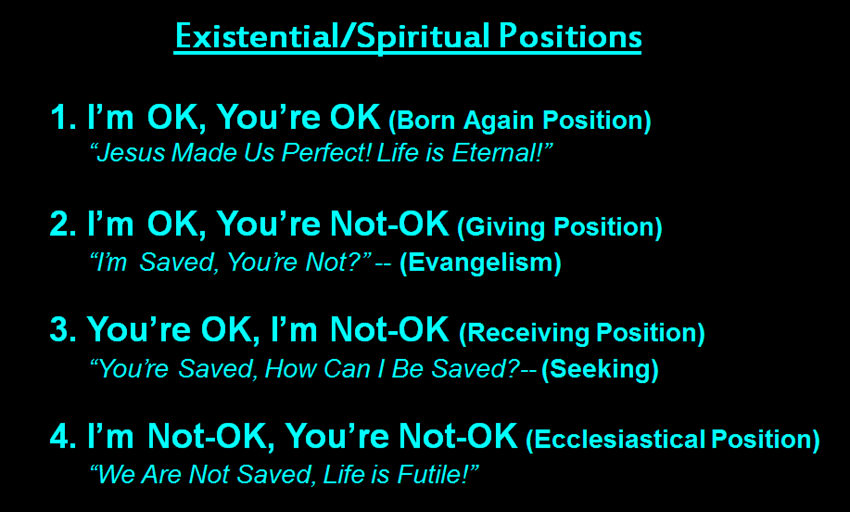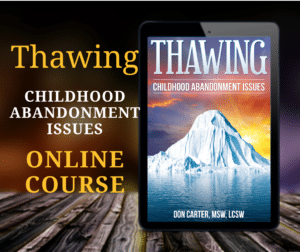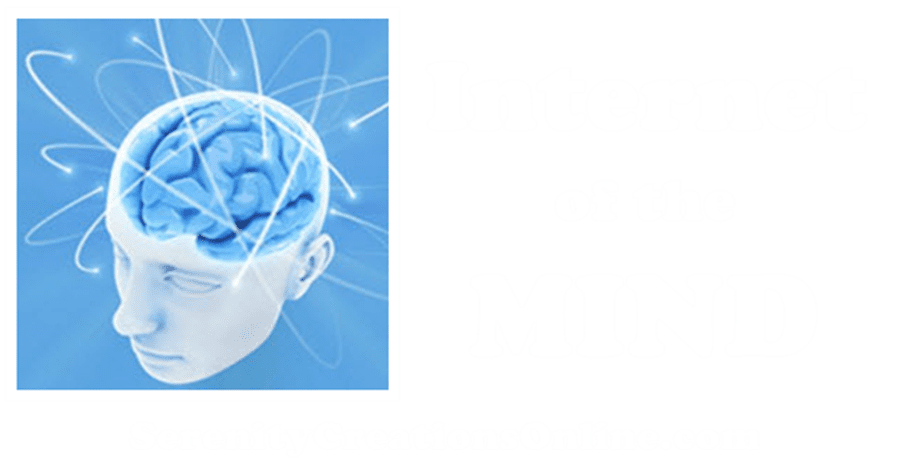
Drama Triangle for Christians
The Drama Triangle for Christians is a part of my series on Psychology and Spirituality. I like to blend psychology and spirituality every chance I get. in fact I like to compare and measure the things I learn and know about psychology with my personal values about Spirituality, which in my case is based on my Christian faith.
See More: Serenity Cafe Academy
To begin, we need to take a look at these existential positions, or psychological positions that we take about ourselves, others, and the world in general.
-
- I’m OK, You’re OK (healthy position)
- I’m OK, You’re Not-OK (projective position) “You’re not worth much.”
- I’m Not-OK, You’re OK (introjective position) “I’m not worth much.”
- I’m Not-OK, You’re Not-OK, Nothing is OK (Futility position) “Life isn’t worth much.”
The Drama Triangle We see that Steve Karpman’s Drama Triangle is fueled by a “Not-OK” position and that the Triangle is upside down. This is because the primary role in the Triangle is that of a Victim. The Victim is always being victimized, usually by a Persecutor and Rescued by a rescuer. The persecutor can be anything. it may be a person; it may be a problem or condition like addiction, depression, a medical issue, or financial difficulties; or it may be an institution or organization such as society, or the government, or a collection agency, or some other agency. The Rescuer sees the victim as a victim and enables the victim to remain a victim by enabling, fixing, controlling, etc. The goal of the Rescuer is to prevent the victim from being victimized whether it’s by a person, or an addiction, or something else.
Let’s take a look at a mild form of the Drama Triangle: Dad (persecutor) comes home after an especially bad day at work and begins harshly criticizing 12-year-old Johnny (Victim) for not taking out the garbage. Mom (Rescuer) jumps on dad for being too harsh and critical trying to rescue Johnny. Johnny gets upset because Dad (Victim) is getting attacked by Mom (Persecutor) and jumps on (Persecutes) Mom for attacking (Persecuting) Dad in an effort to Rescue Dad, And here we can see that there’s a lot of shifting in these roles. This is what puts the Drama in the Drama Triangle!
In a more severe case, let’s say Dad is an alcoholic (Persecutor). Mom is forever trying to rescue dad from the consequences of his drinking problem and trying to rescue the kids from the fallout. Dad comes home and beats the kids in an alcoholic rage, the neighbors call the Police (Persecutors), the kids (Rescue Dad) lie to Child Services worked who come to investigate allegations of child abuse. In these cases, there are genuine victims (the Kids), genuine persecutors (Police), and genuine rescuers (Child Services). It is only later in adulthood that these originally genuine victims learn to play the Drama Triangle as a way of coping (or not coping) with life.
The Empowerment Triangle The alternative to the Drama Triangle is David Emerald’s Empowerment Triangle. The existential position taken by one who lives by this model is the healthy “OK” position. The orientation of the Empowerment Triangle is the opposite of the Drama Triangle, it points to the UP position because the opposite of a Victim is a Creator. The Creator is the person who takes responsibility and accountability for creating the circumstances in their life when it is within their control. Indeed, if we look at what the Bible says we see that we are made in God’s image; God is a CREATOR on a massive scale! Being made in His image, we are also Creators in that we can create our life and are not just passive victims in whatever comes along (at least not in this model).
In the Empowerment Triangle, there are no Rescuers but they are Coaches. A “Coach” is anyone who’s there, standing on the sidelines, who can be a resource for the Creator. If I don’t know what to do about a particular challenge or issue, then I can take a timeout, go to the sideline, and consult one of my Coaches. The main difference between a coach and a Rescuer is that the latter will put me on the bench and go in to play the game for me, while a Coach will give me ideas and options for playing the game but stay on the sidelines. A Coach can be any supportive person, a mentor, a pastor, or a professional in the field for which I need help. We can even consult our inner Coach Who we know as the Holy Spirit.
In the Empowerment Triangle, there is no such thing as a Persecutor. There are only challengers or opportunities for growth. If any person, condition, situation, institution, or organization does anything that could be considered Persecuting, then the Creator sees it as an opportunity for growth; we can rise to the challenge and/or learn something new from each experience. If we don’t have the ability to deal with it on our own, we can consult our Coaches.
Renewing of Our Minds
The Bible encourages us to read God’s Word and “Be Transformed, by the Renewing of our Minds.” When we look at the Drama Triangle we can see that all of the roles are actually victim roles. The Persecutor feels like a victim because if others would only listen and do what they say then things would be great! The Rescuer feels like a victim because no one understands all that they sacrifice and that they are only trying to help. And, of course, the Victim feels powerless and sees everyone and everything as either a Persecutor or a Rescuer.
So, we can think of the Drama Triangle as a Victim Mentality (Mindset). Conversely, we can see the Empowerment Triangle as a Creator Mentality (Mindset). Since it was learned from an early age, the Victim Mentality is the habitual mindset. The Creator Mentality has to be learned. God’s Word (the Bible) is the instruction manual for the Creator Mentality. When we study it and focus our attention on it, we are not giving fuel to the Victim Mentality. Instead, we are literally being “…transformed, by the renewing of our minds.” Emmet Fox liked to remind us that “we cannot create one thing while dwelling on another.”
Drama Triangle for Christians So putting the victim mentality and the Creator mentality side by side we can see that they are driven by two different forces. The Victim Mentality is grounded in our sinful nature and based on the lies of Satan (SS). While the Creator Mentality is based on God’s Will as defined by God’s Word (GW).
And we can easily trace the roots of the drama triangle all the way back to the Garden of Eden. Because indeed there was a drama that played out in the Garden as described in the Book of Genesis. The first victim was Eve who was taken in by Satan who pretended to be The Rescuer while framing God as the persecutor. Being the father of Lies, he pretended to be concerned that Adam and Eve were being deceived by God who did not want them to eat the apple from the tree of life because then they would become like him. Eve, being the victim, also brought Adam into the picture by having him eat of the Apple.
So Adam and Eve hid from God and when God found them He asked Adam “who told you that you were naked”, and asked him if they ate from the Tree of Life. If he was anyone but God, he may have been tempted to be a Rescuer. But since God is the Creator of all things He can’t be tempted so did not engage in the Victim Mentality. God had no choice but to stay with his Creator Mentality and to hold Adam and Eve accountable for their choices, even though Satan was the Persecutor.
Adam even attempted to get God to Rescue him and Eve by saying, “It was the woman that you made for me.” That was the first rationalization. Adam was trying to rationalize his behavior and appeal to God to Rescue him from his mistakes by blaming Eve and God Himself! (Little did Adam know that God did have a plan to rescue him but that He would have to Create the circumstances for that plan to play itself out.)
So sin entered the world and Satan, continuing to be the father of Lies gave us an ongoing victim mentality. Satan continues to this day pretending to be the Rescuer and making it seem that other people, places, and things are our Persecutors. In this way he keeps us in the Victim Mentality and frequently in the fight or flight survival-mode where we are either fighting or running away from our problems.
Whereas God would have us in growth-mode also known as the Creator Mentality. Because he knows that from here we are able to face any challenges that come along. He gave us an instruction manual called the Bible to guide us in this mindset. In his Word there’s a lot of references to what would happen if we try to do things on our own from our own power. In fact, in the gospel of John it says that “…apart from him we can do nothing” but with God in the center of our life “all things are possible.”
So by taking the Creator role, utilizing our coaches, and refusing to see anything or anyone as a persecutor but rather as a challenge or opportunity for growth, we can succeed in his will for us.
Walking in the Spirit Now there’s one more important point I’d like to make when looking at the drama triangle from a Christian perspective. When we are in survival mode we are in the flesh. When we are in growth mode we are in the spirit. Romans 7 and 8 talk all about what it’s like when we live in The flesh versus living in the Spirit. in Romans 7 Paul talks a lot of wanting to do one thing and instead doing another when he says something like, ‘Why is it that I don’t do what I will to do, and I do that which I will not to do, for if I am doing the very evil that I will not to do, then it is no longer me doing it but sin which dwells in me.’
And later on in Romans Chapter 8, there are some passages that this whole conversation builds up to where Paul says “Those who walk according to the flesh, set their minds on things of the flesh. Those who walk according to the Spirit, set their minds on things of the Spirit.’ So it can become very easy to test this model out by just noticing things are going wrong or when they’re going right. When we are walking according to the flesh and setting our minds on things of the flesh, it’s obvious that we are in the Victim Mentality. Conversely, when we are walking according to the Spirit, and setting our minds on things of the Spirit, we are in the Creator Mentality.
In the Victim Mentality, we are out of sync with God’s will for us and living according to the flesh which means we are in our sinful nature, selfish and self-centered, and listening to the lies of Satan. When we are in the Creator Mentality, we are in sync with God’s will for us and living according to His Word in each situation. Things always work out when we are in sync with his will for us. The Bible is the Manual on God’s will for us in every circumstance.
So if you feel like you’re beating your head against the wall, you might want to take a look at what mentality you are operating from. A word of caution here: when we read chapter 8 of Romans and see where it says that those who walk according to the spirit, set their minds on things of the spirit and those who walk according to the flesh on things of the flesh it’s easy to see how we might mistake that to mean some of us walk according to the flesh and others of us walk according to the spirit. In actuality, we all do both because as Paul says ‘…I do that which I will not to do and I don’t do that which I will to do.’
In recovery-oriented work we find that we can get triggered into self-preservation, or survival mode, pretty easily and have to work our way out of that back into self-actualization, or growth mode. In Paul’s words, we find that ‘…members of our body, our flesh, (are) waging war with the laws of our mind, our spirit.’ So this is why it’s a daily battle between the spirit and the flesh. I need God’s will, His word, and His power to stay in growth-mode. I need to saturate my brain with His Word so I can ‘…be transformed by the renewing of my mind (or Mentality).’
So let’s take a look at one more thing. We started out with these psychological positions that we can take about ourselves, other people, and life in general…
-
- I’m OK, You’re OK (healthy position)
- I’m OK, You’re Not-OK (projective position) “You’re not worth much.”
- I’m Not-OK, You’re OK (introjective position) “I’m not worth much.”
- I’m Not-OK, You’re Not-OK, Nothing is OK (Futility position) “Life isn’t worth much.”
We can modify these existential positions into Spiritual Positions about ourselves, other people, and life in general as follows:
Existential Spiritual Positions In Conclusion…
Whenever things get tough and it feels like you’re spinning your wheels, take a look at this page again. Decide if you are feeling like a victim, treating others like a persecutor, or feeling responsible to rescue someone from their own choices. Or are you living as the Creator of your own life, or a Coach available to others, and taking everything as an opportunity for growth or a challenge to overcome.

